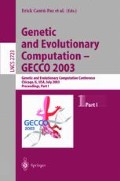Abstract
There are conflicting reports over whether multiple independent runs of genetic algorithms (GAs) with small populations can reach solutions of higher quality or can find acceptable solutions faster than a single run with a large population. This paper investigates this question analytically using two approaches. First, the analysis assumes that there is a certain fixed amount of computational resources available, and identifies the conditions under which it is advantageous to use multiple small runs. The second approach does not constrain the total cost and examines whether multiple properly-sized independent runs can reach the optimal solution faster than a single run. Although this paper is limited to additively-separable functions, it may be applicable to the larger class of nearly decomposable functions of interest to many GA users. The results suggest that, in most cases under the constant cost constraint, a single run with the largest population possible reaches a better solution than multiple independent runs. Similarly, a single large run reaches the global faster than multiple small runs. The findings are validated with experiments on functions of varying difficulty.
Access this chapter
Tax calculation will be finalised at checkout
Purchases are for personal use only
Preview
Unable to display preview. Download preview PDF.
References
Tanese, R.: Distributed genetic algorithms. In Schaffer, J.D., ed.: Proceedings of the Third International Conference on Genetic Algorithms, Morgan Kaufmann (1989) 434–439
Shonkwiler, R.: Parallel genetic algorithms. In Forrest, S., ed.: Proceedings of the Fifth International Conference on Genetic Algorithms, Morgan Kaufmann (1993) 199–205
Cantú-Paz, E., Goldberg, D.E.: Modeling idealized bounding cases of parallel genetic algorithms. In Koza, J., et al., eds.: Proceedings of the Second Annual Genetic Programming Conference, Morgan Kaufmann (1997) 353–361
Fuchs, M.: Large populations are not always the best choice in genetic programming. In Banzhaf, W., et al., eds.: Proceedings of the Genetic and Evolutionary Computation Conference, Morgan Kaufmann (1999) 1033–1038
Fernández, F., Tomassini, M., Punch, W., Sánchez, J.M.: Experimental study of isolated multipopulation genetic programming. In Whitley, D., et al., eds.: Proceedings of the Genetic and Evolutionary Computation Conference, Morgan Kaufmann (2000) 536
Wolpert, D., Macready, W.: No-free-lunch theorems for optimization. IEEE Transactions on Evolutionary Computation 1 (1997) 67–82
Harik, G., Cantú-Paz, E., Goldberg, D., Miller, B.L.: The gambler’s ruin problem, genetic algorithms, and the sizing of populations. Evolutionary Computation 7 (1999) 231–253
Nakano, R., Davidor, Y., Yamada, T.: Optimal population size under constant computation cost. In Davidor, Y., Schwefel, H.P., Männer, R., eds.: Parallel Problem Solving fron Nature, PPSN III, Berlin, Springer-Verlag (1994) 130–138
Luke, S.: When short runs beat long runs. In Spector, L. et al., eds.: Proceedings of the Genetic and Evolutionary Computation Conference, Morgan Kaufmann (2001) 74–80
Mitchell, M., Holland, J.H., Forrest, S.: When will a genetic algorithm outperform hill climbing? In Advances in Neural Information Processing Systems 6 (1994) 51–58
Baum, E., Boneh, D., Garrett, C.: Where genetic algorithms excel. Evolutionary Computation 9 (2001) 93–124
Goldberg, D.E.: Genetic algorithms in search, optimization, and machine learning. Addison-Wesley, Reading, MA (1989)
Goldberg, D.E., Deb, K., Clark, J.H.: Genetic algorithms, noise, and the sizing of populations. Complex Systems 6 (1992) 333–362
Feller, W.: An Introduction to probability theory and its applications. 2nd edn. Volume 1. John Wiley and Sons, New York, NY (1966)
van Dijk, S., Thierens, D., de Berg, M.: Scalability and efficiency of genetic algorithms for geometrical applications. In Schoenauer, M., et al., eds.: Parallel Problem Solving from Nature—PPSN VI, Berlin, Springer-Verlag (2000) 683–692
Arnold, B., Balakrishnan, N., Nagaraja, H.N.: A first course in order statistics. John Wiley and Sons, New York, NY (1992)
Mühlenbein, H., Schlierkamp-Voosen, D.: Predictive models for the breeder genetic algorithm: I. Continuous parameter optimization. Evolutionary Computation 1 (1993) 25–49
Deb, K., Goldberg, D.E.: Analyzing deception in trap functions. In Whitley, L.D., ed.: Foundations of Genetic Algorithms 2, Morgan Kaufmann (1993) 93–108
Miller, B.L., Goldberg, D.E.: Genetic algorithms, selection schemes, and the varying effects of noise. Evolutionary Computation 4 (1996) 113–131
Cantú-Paz, E.: Efficient and Accurate Parallel Genetic Algorithms. Kluwer Academic Publishers, Boston, MA (2000)
Author information
Authors and Affiliations
Editor information
Editors and Affiliations
Rights and permissions
Copyright information
© 2003 Springer-Verlag Berlin Heidelberg
About this paper
Cite this paper
Cantú-Paz, E., Goldberg, D.E. (2003). Are Multiple Runs of Genetic Algorithms Better than One?. In: Cantú-Paz, E., et al. Genetic and Evolutionary Computation — GECCO 2003. GECCO 2003. Lecture Notes in Computer Science, vol 2723. Springer, Berlin, Heidelberg. https://doi.org/10.1007/3-540-45105-6_94
Download citation
DOI: https://doi.org/10.1007/3-540-45105-6_94
Published:
Publisher Name: Springer, Berlin, Heidelberg
Print ISBN: 978-3-540-40602-0
Online ISBN: 978-3-540-45105-1
eBook Packages: Springer Book Archive

